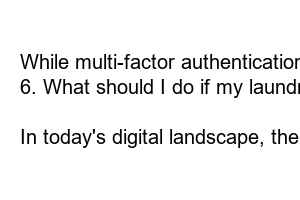세탁업 사이버 위생교육
Title: Elevating Cyber Hygiene Education in the Laundry Industry
Introduction:
The laundry industry, like many others, is embracing digital transformation to streamline processes and enhance efficiency. However, with digitization comes the heightened risk of cyber threats. To protect the industry from potential breaches and maintain customer trust, it is crucial to prioritize cyber hygiene education. In this blog post, we delve into the significance of cyber hygiene in the laundry industry and highlight key measures to ensure a safe and secure environment.
1. The Relevance of Cyber Hygiene in the Laundry Industry:
Maintaining good cyber hygiene is of paramount importance in the laundry industry, where data breaches can compromise customer information, interrupt operations, and damage reputation. By implementing comprehensive cyber hygiene practices, laundry businesses can safeguard themselves from cyber attacks and instill confidence in their customers.
2. Creating Strong Passwords:
One fundamental aspect of cyber hygiene is creating strong passwords. Encouraging employees to utilize complex passwords, incorporating a combination of upper and lowercase letters, numbers, and special characters, significantly strengthens the security of laundry systems and accounts.
3. Regular Software Updates:
Frequently updating software and applications is essential in minimizing vulnerabilities that cybercriminals can exploit. Regular updates provide patches for identified vulnerabilities, ensuring that laundry businesses stay ahead of potential threats.
4. Employee Training and Awareness:
Educating employees about cyber threats and fostering a culture of cybersecurity awareness is vital in the laundry industry. Regular training sessions can teach employees to recognize phishing attempts, avoid suspicious links, and exercise caution when handling sensitive customer data, reducing the risk of cyber incidents.
5. Utilizing Secure Networks and VPNs:
Securing laundry industry networks through the usage of Virtual Private Networks (VPNs) adds an extra layer of protection. VPNs encrypt data transmitted between laundry facilities, preventing unauthorized access and safeguarding customer information.
6. Implementing Multi-Factor Authentication:
Enforcing multi-factor authentication across all laundry systems adds an additional layer of security, reducing the likelihood of unauthorized access even if passwords are compromised. This effective measure helps *mitigate the risks of cyber threats.
Frequently Asked Questions (FAQs):
1. How can I educate employees about cyber hygiene in the laundry industry?
Providing regular training sessions on cybersecurity best practices, conducting mock phishing simulations, and promoting awareness campaigns can educate employees effectively.
2. What are the consequences of poor cyber hygiene in the laundry industry?
Lack of cyber hygiene can lead to reputational damage, financial loss, data breaches, legal consequences, and disruptions in daily operations.
3. Are software updates really that important for the laundry industry?
Yes, regular software updates are crucial as they often patch known vulnerabilities, increasing security measures for laundry facilities.
4. How can VPNs benefit the laundry industry’s cybersecurity?
VPNs encrypt data transmissions between laundry facilities, preventing unauthorized access and protecting sensitive customer information.
5. Can multi-factor authentication prevent all cyber threats in the laundry industry?
While multi-factor authentication provides an additional layer of security, it is essential to adopt a holistic approach to cybersecurity, combining multiple protective measures.
6. What should I do if my laundry business suffers a cybersecurity breach?
In the event of a breach, it is crucial to notify the appropriate authorities, perform a thorough investigation, strengthen security measures, and inform affected customers promptly.
Summary:
In today’s digital landscape, the laundry industry cannot afford to overlook the significance of cyber hygiene education. By implementing strong passwords, regular software updates, employee training and awareness programs, secure networks, VPNs, and multi-factor authentication, laundry businesses can proactively defend against cyber threats. Prioritizing cyber hygiene is essential to protect customer data, maintain operational efficiency, and uphold trust within the industry.

